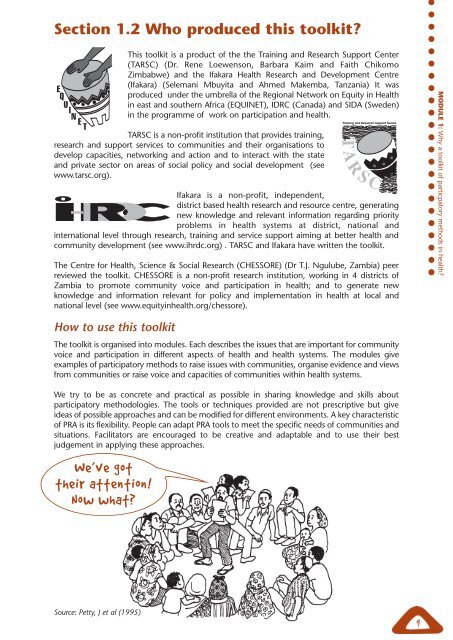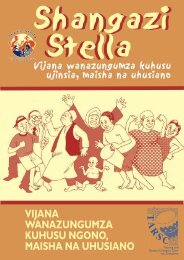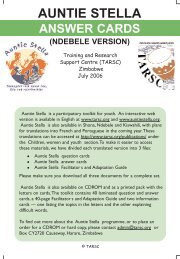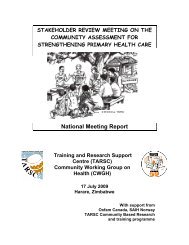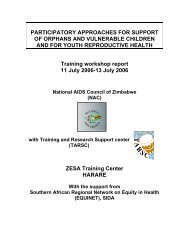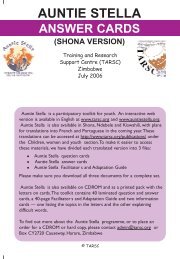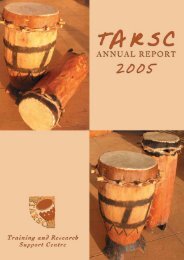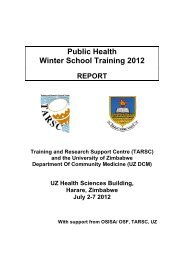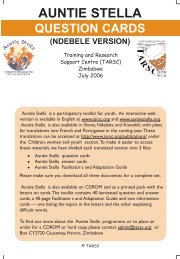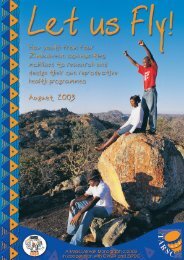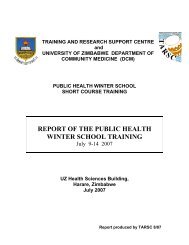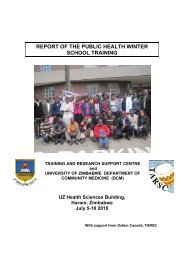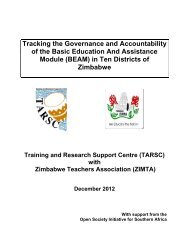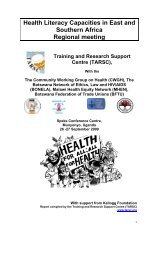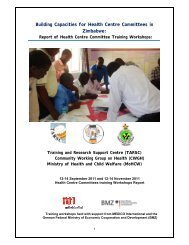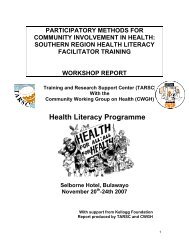PRA toolkit sample.pdf - Training and Research Support Centre
PRA toolkit sample.pdf - Training and Research Support Centre
PRA toolkit sample.pdf - Training and Research Support Centre
You also want an ePaper? Increase the reach of your titles
YUMPU automatically turns print PDFs into web optimized ePapers that Google loves.
Section 1.2 Who produced this <strong>toolkit</strong>?<br />
This <strong>toolkit</strong> is a product of the the <strong>Training</strong> <strong>and</strong> <strong>Research</strong> <strong>Support</strong> Center<br />
(TARSC) (Dr. Rene Loewenson, Barbara Kaim <strong>and</strong> Faith Chikomo<br />
Zimbabwe) <strong>and</strong> the Ifakara Health <strong>Research</strong> <strong>and</strong> Development <strong>Centre</strong><br />
(Ifakara) (Selemani Mbuyita <strong>and</strong> Ahmed Makemba, Tanzania) It was<br />
produced under the umbrella of the Regional Network on Equity in Health<br />
in east <strong>and</strong> southern Africa (EQUINET), IDRC (Canada) <strong>and</strong> SIDA (Sweden)<br />
in the programme of work on participation <strong>and</strong> health.<br />
TARSC is a non-profit institution that provides training,<br />
research <strong>and</strong> support services to communities <strong>and</strong> their organisations to<br />
develop capacities, networking <strong>and</strong> action <strong>and</strong> to interact with the state<br />
<strong>and</strong> private sector on areas of social policy <strong>and</strong> social development (see<br />
www.tarsc.org).<br />
Ifakara is a non-profit, independent,<br />
district based health research <strong>and</strong> resource centre, generating<br />
new knowledge <strong>and</strong> relevant information regarding priority<br />
problems in health systems at district, national <strong>and</strong><br />
international level through research, training <strong>and</strong> service support aiming at better health <strong>and</strong><br />
community development (see www.ihrdc.org) . TARSC <strong>and</strong> Ifakara have written the <strong>toolkit</strong>.<br />
The <strong>Centre</strong> for Health, Science & Social <strong>Research</strong> (CHESSORE) (Dr T.J. Ngulube, Zambia) peer<br />
reviewed the <strong>toolkit</strong>. CHESSORE is a non-profit research institution, working in 4 districts of<br />
Zambia to promote community voice <strong>and</strong> participation in health; <strong>and</strong> to generate new<br />
knowledge <strong>and</strong> information relevant for policy <strong>and</strong> implementation in health at local <strong>and</strong><br />
national level (see www.equityinhealth.org/chessore).<br />
MODULE 1: Why a <strong>toolkit</strong> of particpatory methods in health?<br />
How to use this <strong>toolkit</strong><br />
The <strong>toolkit</strong> is organised into modules. Each describes the issues that are important for community<br />
voice <strong>and</strong> participation in different aspects of health <strong>and</strong> health systems. The modules give<br />
examples of participatory methods to raise issues with communities, organise evidence <strong>and</strong> views<br />
from communities or raise voice <strong>and</strong> capacities of communities within health systems.<br />
We try to be as concrete <strong>and</strong> practical as possible in sharing knowledge <strong>and</strong> skills about<br />
participatory methodologies. The tools or techniques provided are not prescriptive but give<br />
ideas of possible approaches <strong>and</strong> can be modified for different environments. A key characteristic<br />
of <strong>PRA</strong> is its flexibility. People can adapt <strong>PRA</strong> tools to meet the specific needs of communities <strong>and</strong><br />
situations. Facilitators are encouraged to be creative <strong>and</strong> adaptable <strong>and</strong> to use their best<br />
judgement in applying these approaches.<br />
We’ve got<br />
their attention!<br />
Now what?<br />
Source: Petty, J et al (1995)<br />
9


